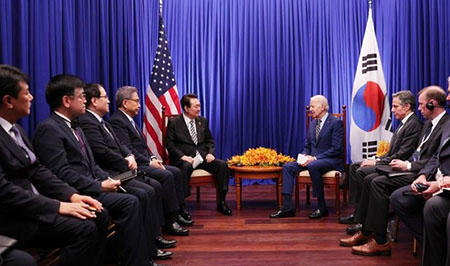by WorldTribune Staff, April 26, 2023
In January, South Korea’s new conservative leader, President Yoon Suk-Yeol, ruffled feathers in Washington when he said the South could develop its own nuclear weapons or ask the U.S. to redeploy nukes on the Korean Peninsula if the threat from North Korea grows.
No South Korean leader had explicitly raised the prospect in decades. Times have changed, however, and the new existential nuclear threat from North Korea looms large. What’s more, even polls in relatively liberal South Korea call for the development of its own nuclear weapons.

The U.S. deployed tactical nuclear weapons in South Korea in 1958, five years after a truce suspended without ending the Korean War in which U.S. and UN forces helped the South push back a China-assisted North Korean invasion. But the U.S. strategic weaons were removed following the end of the Cold War in 1991.
Meanwhile, the North Korean nuclear arsenal has evolved from threats to reality and is rapidly expanding, reportedly with the covert assistance of China, as chronicled by Geostrategy-Direct.com.
Team Biden has insisted it is not planning to redeploy nuclear weapons on the Korean Peninsula.
However on Wednesday, the two countries released text of a new “Washington Declaration,” which is a demonstration of America’s willingness to use its nuclear deterrent to protect South Korea.
The declaration, released as Yoon visited the White House, states that Seoul will have a greater voice in consultations on a potential American nuclear response to a North Korean attack in return for swearing off developing its own nuclear weapons, the Wall Street Journal cited U.S. officials as saying.
Under the agreement, South Korea’s leadership will get a long-sought place at the table on the use of U.S. nuclear forces to defend South Korea, the Journal’s report said. The U.S. would still retain control over targeting and the execution of nuclear operations. Seoul, in return, would restate its commitment not to develop its own nuclear arsenal.
The accord also states that a U.S. ballistic missile submarine will make a high-profile visit to South Korea.
In 1975, South Korean joined the Nuclear Nonproliferation Treaty, under which nations without nuclear weapons agree never to develop or acquire them.
The new agreement will formally commit the U.S. to “make every effort to consult” with South Korea on the potential use of nuclear weapons. That will involve maintaining what the declaration calls a “robust communications infrastructure” to facilitate top-level consultations during a nuclear crisis.
“The accord will establish a new Nuclear Consultative Group in which senior officials from the two countries would regularly meet to discuss how to reinforce deterrence and the cases in which nuclear weapons might be used,” the Journal’s report noted.
Like many other U.S. allies in the East, South Korea is also confronting a rapidly-expanding China threat while U.S. policy changes with each new occupant of the White House, analysts say.
“President Yoon is finally bucking two decades of Chinese coercion that has made South Korea limit its criticism of China in order to sustain profitable economic ties, and even limit it missile defense cooperation with the United States,” Rick Fisher wrote in an April 25 Geostrategy-Direct.com analysis.
Related: U.S. allies awaken, mount global pushback against rising Chinese aggression, April 25, 2023
Toward the end of an interview with Reuters published on April 19, Yoon angered Beijing with strong and unprecedented statements regarding China’s coercion of Taiwan: “After all, these tensions occurred because of the attempts to change the status quo by force, and we together with the international community absolutely oppose such a change…The Taiwan issue is not simply an issue between China and Taiwan but, like the issue of North Korea, it is a global issue.”
Fisher wrote: “Yoon and South Koreans are tiring of China’s constant nuclear and missile assistance to North Korea and that, with China’s continuing military threats, are adding to South Korean doubts over America’s nuclear and non-nuclear deterrent.”
Membership . . . . Intelligence . . . . Publish
